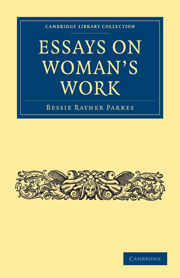III - EDUCATED DESTITUTION
Published online by Cambridge University Press: 05 July 2011
Summary
ACCORDING to the different constitution of different minds, will be the relative importance attached to problems affecting the many or the few. It may reasonably be urged that penniless women in the upper classes, though comparatively few in number, are more important than the mass of their working fellow-countrywomen, because of their superior influence on the future. In this chapter we will exclusively consider the case of ladies who have to earn their own living.
The proportion of the entire upper and middle classes to the lower is in itself but small; most people would be surprised to realise how small, for, taken together, the two first do not number half the latter, nor consequently a third of the whole population. It has been roughly calculated that the middle ranks are about three times as numerous as the aristocratic, and that the working classes are about three times as numerous as the middle ranks; or in other words, of thirteen units, one would represent the aristocracy, three the middle ranks, and the remaining nine stand for the “masses.” So that four parts out of thirteen are all with which I now mean to deal; and of this proportion only the female members; and of these again only that section which has to gain its daily bread.
How large is that section? Let us inquire. Everybody will at once admit that the theory of civilised life in this and all other countries, not excluding the democratic States of America, is that the women of the upper and middle classes are supported by their male relatives: daughters by their fathers, wives by their husbands.
- Type
- Chapter
- Information
- Essays on Woman's Work , pp. 71 - 84Publisher: Cambridge University PressPrint publication year: 2010First published in: 1865



